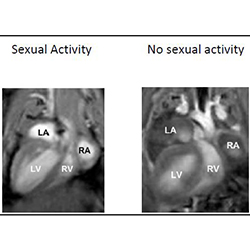Study Suggests Sexual Activity Can be Beneficial in Heart Failure
A healthy heart could be attributed to your sex life. A study conducted by researchers at the University of Arizona College of Medicine – Phoenix suggests that sexual activity may not only be safe, but it may be beneficial in patients with heart failure.
The Cardiovascular Disease Research group from the U of A College of Medicine – Phoenix Department of Internal Medicine led the study, which was published in the International Journal of Molecular Sciences in July 2020.
Heart failure causes death and disability in millions of people worldwide. The group analyzed whether heart failure and survival are adversely affected by lack of sexual interaction. Their experimental findings suggest a new conceptual paradigm of heart failure, which recognizes that lifestyle and behavioral activities modify gene expression in the heart to alter the development of heart failure and delay its progression.

To monitor heart failure progression, researchers used human clinical diagnostic modalities, such as echocardiography and magnetic resonance imaging, and a comparative analysis of heart gene expression to monitor heart failure progression.
The research was a collaboration between basic-translational scientists Dr. Gladysheva, a professor in the Department of Internal Medicine, and Ranjana Tripathi, PhD, a postdoctoral research associate, and translational and clinical scientists Guy Reed, MD, MS, dean of the College of Medicine – Phoenix; Ryan Sullivan, DVM, an assistant professor in the Department of Internal Medicine; Radhika Mehta, MD, a postdoctoral research associate in Internal Medicine, and Tai-Hwang Fan, MD, a cardiologist and associate professor in the Department of Medicine at the University of Tennessee Health Science Center.
“For a lot of heart failure patients, sexual health is important,” Dr. Sullivan said. “As many as 52 percent of the men and 38 percent of the women with heart failure reported that sex was important and sexual health was impacting their quality of life. However, heart failure patients and their partners may be reluctant to engage in sexual activity, because of fear of damaging their heart. They may also be reluctant to openly discuss this activity with their physicians, and physicians frequently do not consider sexual activity in their care for these patients.”
Researchers said that more clinical and experimental studies are needed to address the safety and long-term effects of sexual activity for heart failure patients.
“The impact of lifestyle on heart failure outcomes remains poorly understood and is often overlooked,” Dr. Gladysheva said. “Our study suggests that lifestyle and behavioral activities, in particular sexual activity, may have significant positive effects on heart failure outcomes. Further research needs to confirm these findings in heart failure patients and to better understand the mechanisms responsible for the protective effect of sexual activity in heart failure.”
About the College
Founded in 2007, the University of Arizona College of Medicine – Phoenix inspires and trains exemplary physicians, scientists and leaders to advance its core missions in education, research, clinical care and service to communities across Arizona. The college’s strength lies in our collaborations and partnerships with clinical affiliates, community organizations and industry sponsors. With our primary affiliate, Banner Health, we are recognized as the premier academic medical center in Phoenix. As an anchor institution of the Phoenix Bioscience Core, the college is home to signature research programs in neurosciences, cardiopulmonary diseases, immunology, informatics and metabolism. These focus areas uniquely position us to drive biomedical research and bolster economic development in the region.
As an urban institution with strong roots in rural and tribal health, the college has graduated more than 1,000 physicians and matriculates 130 students each year. Greater than 60% of matriculating students are from Arizona and many continue training at our GME sponsored residency programs, ultimately pursuing local academic and community-based opportunities. While our traditional four-year program continues to thrive, we will launch our recently approved accelerated three-year medical student curriculum with exclusive focus on primary care. This program is designed to further enhance workforce retention needs across Arizona.
The college has embarked on our strategic plan for 2025 to 2030. Learn more.